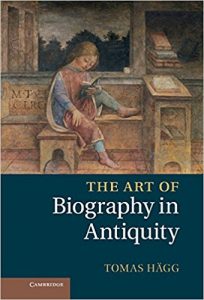“Rages” in the title is a bit of poetic licence. I don’t really think either of the two chapters by classicists discussing the arguments for and against the historicity of an ancient philosopher can be considered “rages”.
My point was to alert potential readers that this post is not a repeat of my post of less than a week ago about the historicity of Demonax : Did the ancient philosopher Demonax exist? That post addressed the views of Tomas Hagg as published in 2012 in The Art of Biography in Antiquity. I was really playing catch-up with that one since one year and two months ago I posted a more recent (published 2016) discussion of another classicist, Mark Beck, addressing the same thorny question: If Biblical Scholars Were Classicists. I was sharing my reading of “Lucian’s Life of Demonax”, a chapter in Writing Biography in Greece and Rome: Narrative Technique and Fictionalization, edited by Koen De Temmerman and Kristoffel Demoen.
Would we have to deny the historicity of most other ancient persons if we reject Demonax?
It is interesting to compare the two different discussions of the question of Demonax’s historicity. How do non-biblical scholars, those dedicated to the study of ancient times, address questions of historicity in those cases where we lack the testimony of monuments, public inscriptions, coins, etc.? The question is of some interest, I suspect, to those who follow what biblical scholars might have to say about certain arguments of the historicity of, let’s say at random, Adam, or Abraham, or Moses, or Jesus.
Do independent contemporary sources decide the question?
In both discussions a primary and very weighty consideration is the absence of contemporary notices. If the person really was so influential as the biography claims, then how do we account for the absence of contemporary witnesses? Why do we have to wait for a person claiming to be a student and eyewitness of the famous person writing something long after the teacher was dead?
Does fictional storytelling decide the question?
It is also interesting that in both discussions the above question is of considerable import, while the fact that it is clearly evident that the extant biography of Demonax contains much fiction is not so important. If someone tells tall tales about a famous teacher, so what? That seems to be the approach. It’s to be expected. Fictional details do not mean the subject did not exist.
Does an eyewitness claim decide the question?
But we have a writing by one who clearly says he was an eyewitness and a student of Demonax! No dice, apparently. That does not count as decisive in either discussion. Anyone could say that about the person they were writing about.
Do independent references decide the question?
In both discussions, the one by Hãgg and the one by Beck, the independent testimony of sayings by Demonax is a significant point. The biographer of Demonax did not make use of what we know of an independent collection of sayings by Demonax. Beck considers these independent sayings attributed to Demonax as enough to tilt the scales in favour of the historicity of Demonax. Hägg is not convinced; for Hägg, such a collection only raises more questions than it answers with respect to the historicity question. Those independent sayings are just a little “too” independent and appear to have no real relevance to the person of Lucian’s biography, according to Hägg. So scholarly opinions differ — interestingly without any apparent need for abusive language and all sorts of ad hominem attacks.
Does a namesake at the right time and place decide the question?
But Hägg does concede that there was a historical Demonax in Athens at the right time. He just does not think that Demonax had much in common with Lucian’s portrait. Beck agrees with the problematic nature of Lucian’s portrait by adding that it is evident that a source for that portrait was Lucian’s own life. Lucian was writing about himself!
Does the function of the biography decide the question?
Both classicists acknowledge that the fact that Lucian’s biography had a clear purpose of teaching readers virtuous principles is itself a point against the historicity of any of the biography’s anecdotes. The author, they agree, wrote with the purpose of teaching virtue and creating a moral exemplar for readers, not with any specific intent to preserve genuine historical memories for posterity.
Back to that question about independent contemporary sources
So the bottom line is that the question of historicity stands or falls on the point of testimony independent of the biography and contemporaneous with the person of interest.


